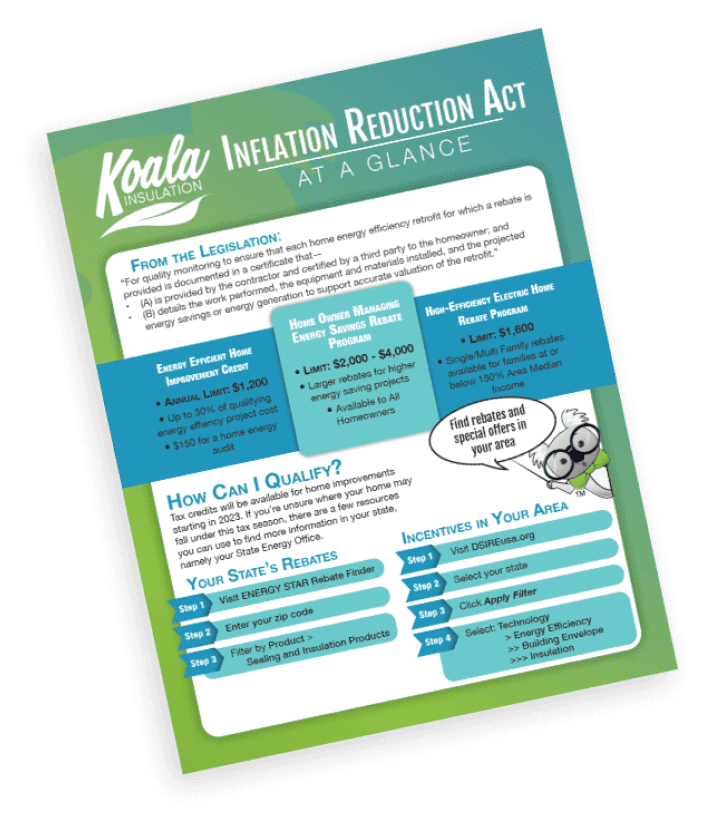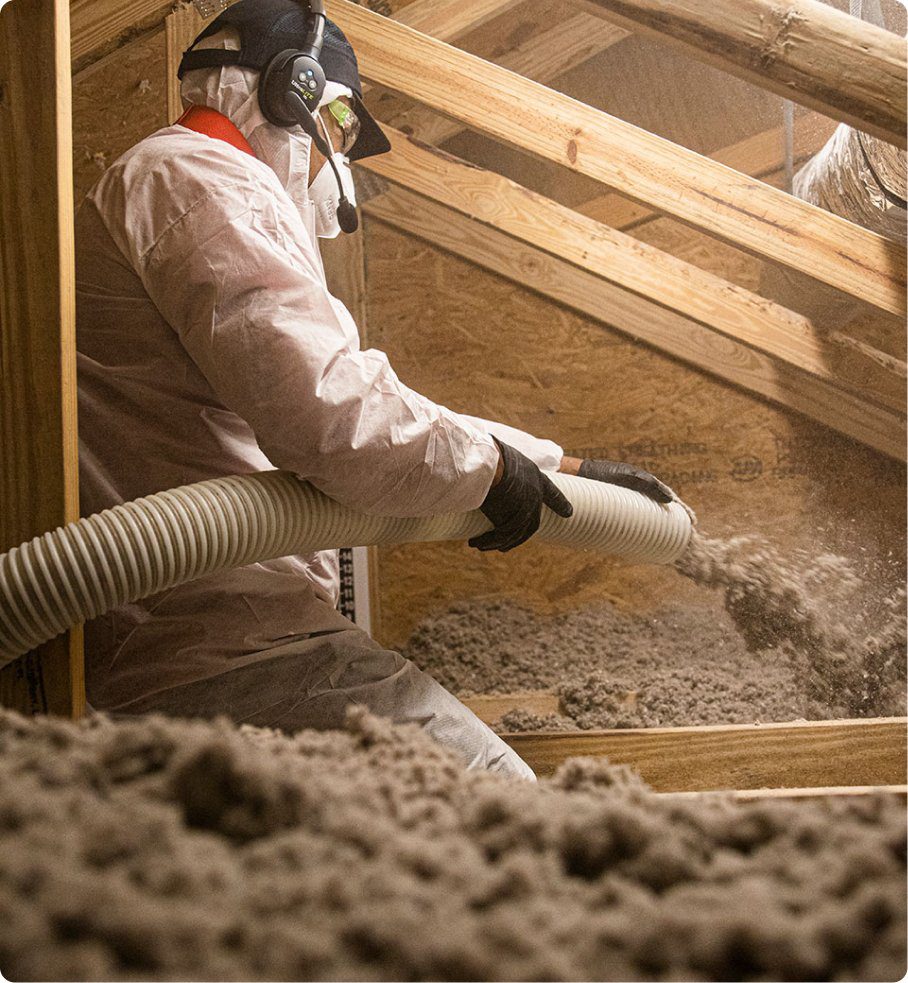Homeowner Incentives West Florida
Save More with Koala Insulation’s Homeowner Incentives


Inflation Reduction Act (IRA)


Energy Efficiency Home Improvement Credit
- Save on Taxes : Get up to 30% of the cost of your insulation project back in tax credits, up to $1,200 annually. All of Koala Insulation's energy efficiency upgrades qualify for the Energy Efficiency Home Improvement Credit!
- Easy Qualification: Our team guides you through the process to ensure you meet all the requirements.
- Immediate Benefits: Enjoy lower energy bills and a more comfortable home right away with improved insulation like blown-in insulation.
- Long-Term Savings: The improvements you make now will keep saving you money for years to come.
- Expert Support: We’re here to help you every step of the way, from selecting the right insulation to filing for your credit.
High-Efficiency Electric Home Rebate Program
- Up to $1,600: Homeowners can receive up to $1,600 in rebates for making energy-saving improvements, including upgrading blown in insulation or spray foam insulation.
-
20% Reduction:
You can qualify for a rebate by reducing your home’s energy use by at least 20%, helping you cut down on energy bills long-term.
- Efficiency Boost: With improved insulation from Koala, like spray foam attic insulation, you'll enjoy a more comfortable home, lower utility costs, and cash back through this rebate program.

High Efficiency Electric Home Rebate Program
< 20%
20%-35%
> 35%
How Can I Qualify?
- Check Eligibility: We review the requirements to see if your home qualifies for programs like the HOMES Rebate or Federal Tax Credits for insulation upgrades.
- Explore Your Options: We explain the available programs and what benefits you can receive.
- Guide Through Application: We assist with the paperwork to make the process smooth.
- Maximize Your Savings: We help you get the most out of these incentives to improve your home’s insulation, whether it’s batt insulation or blown-in foam insulation.
FAQs
How do I find out if I’m eligible for these incentives?
Eligibility varies by program, but don’t worry—our team will help you determine which incentives you qualify for and guide you through the application process.
Who qualifies for Inflation Reduction Act rebates?
Each state sets the exact framework and varies by program, household income, project type, and more. Most homeowners in participating states qualify for at least some home insulation tax credit or similar incentives. Contact your state’s energy department to learn more, or find your local Koala Insulation team.
How do I know if my state offers additional rebates?
Each state has rebate programs that help reduce the cost of certain home improvements. ENERGY STAR Rebate Finder lets you find your state’s programs by zip code. You can find insulation rebates in your area by filtering the search results to “Sealing and Insulation Products.”
Is the process complicated?
It might seem overwhelming, but we make it simple. Koala Insulation takes care of the details, from paperwork to submission, so you can focus on enjoying your energy-efficient home.
Can the Inflation Reduction Act be repealed?
Because the IRA was passed under a Budget Resolution, the act could be repealed by a simple majority vote in the House and Senate. While it’s unlikely the IRA will be repealed entirely, many predict certain provisions within the bill may be rolled back or frozen.
When was the Inflation Reduction Act passed?
While the bill was signed into law in August 2022, multiple parts of the Act have different timelines.
- Energy Efficient Home Improvement credit will be applied to almost all projects (besides certain appliances such as water heaters) completed in 2023, starting January 1.
- The HOMES (Home Owner Managing Energy Savings) Rebate Program, and the High-Efficiency Electric Home Rebate Act within the program, are expected to start in 2023 and last until September 20, 2031. However, the states run these programs, so the start times may vary. In addition, some state-specific incentive programs will steadily receive funds throughout this time.
What kind of incentives can I get for upgrading my home’s insulation?
You may qualify for tax credits, rebates, and other financial incentives when you improve your home’s insulation with Koala. These programs are designed to make energy-efficient upgrades more affordable for homeowners.
When can I get Inflation Reduction Act rebates?
The process to access IRA rebates varies by state. Contact your state’s energy department to learn more about IRA rebates and discover additional state-funded programs for which you may qualify.
When will I receive my rebate or credit?
The timing can vary depending on the program, but we’ll keep you informed every step of the way and help ensure you get your rebate or credit as quickly as possible.
How much can I expect to save with these incentives?
Savings vary depending on the specific program and your home’s needs. Our experts will provide an estimate based on your situation, so you know what to expect.
Can I combine multiple incentives?
Yes, in many cases, you can combine different incentives to maximize your savings. We’ll help you navigate the options to ensure you get the best deal possible.
How does the IRA focus on environmental impact?
According to the EPA’s study on sources of greenhouse gas (GHG) emissions, the commercial and residential sectors were responsible for 13% of GHG emissions in 2022. Other sources project an updated statistic of 25%, considering building construction, product use, and waste in households and businesses. The Act is projected to reduce pollution by 40% by 2023, using rebates and tax credits to incentivize property owners to make energy-efficiency improvements.
Get a quote


